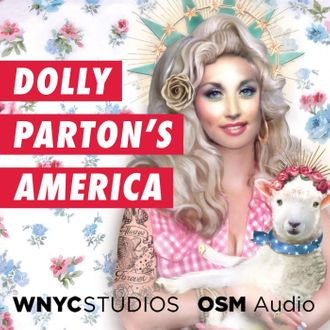
“Well, Dolly Parton’s America would be the same as Dolly Parton’s world,” declares Parton in the opening of Jad Abumrad’s (Radiolab, More Perfect) latest WNYC podcast, Dolly Parton’s America. The rest of the thought goes unsaid, but it’s easy enough to pick up on: It’s Dolly Parton’s World, and the rest of us are just living in it. And so begins an investigation into the Dollyverse and Parton’s unflinching, universal appeal.
It would be easy to write Dolly Parton’s America off as another aggrandizing account of Parton, the country singer turned pop-culture icon whose existence and evolution are often elevated to mythical proportions. Even the podcast’s tagline plays into the lore surrounding the star, promoting itself as “the story of a legend at the crossroads of America’s culture wars.” But get past the hype, and what follows is a good example of how to conduct deeply personal journalistic work that retains both a level of compassion and criticism.
Dolly Parton’s America is a passion project years in the making. As a Tennessee native, Abumrad grew up acutely aware of his fellow Tennessean; hearing her music almost everywhere and taking trips to Dollywood, the theme park and anchor of her 150-acre amusement destination in Appalachia, he says she was so ubiquitous that she just “infused the air.” It wasn’t until 2016, however, that he realized the musician’s reach outside of the south. While at a concert in Flushing, Queens, he noted the level of excitement in the crowd as “otherworldly” and thought to himself that “in this very divided moment, Dolly seems to maybe be a kind of unifier.”
Following this thread, Abumrad called in a favor and asked his father, a doctor who had met Parton three years earlier when she was in a minor car accident, to connect them. “My dad is not a doctor-to-the-stars kind of person. He’s just a Lebanese guy in Tennessee,” Abumrad says, foreshadowing the friendship his dad and Parton struck up, which becomes a focal point later in the series thanks to an especially heartwarming conversation.
Those familiar with Radiolab, which Abumrad founded and co-hosts, will hear the similarities. Produced by Shima Oliaee, layered voices dance atop one another while music, mostly Parton’s, weaves in and out, creating a sort of soundtracked Socratic debate as Abumard attempts to answer the question at the core of Dolly Parton’s America: “In this intensely divided moment, one of the few things everyone still seems to agree on is Dolly Parton — but why?” Featuring writers, historians, musicians, and more, the nine-episode podcast is an example of putting in the necessary work to provide a complete picture of a person who is usually painted in much broader strokes — in Parton’s case, as either a caricatured bimbo or a patron saint — all the while inviting her to speak for herself, something that’s not always afforded to women when their stories are told.
Among the many moments that stand out is the question of whether Dolly is a feminist. The podcast makes its stance clear. “She was like the O.G. third-wave feminist,” says author Sarah Smarsh, who explains that during a time when many women with Parton’s business ambitions were being encouraged to downplay their “femininity,” she was putting hers on full display instead. It’s as if to say, “You have a problem with my tits? Then here they are, hanging out, and you can deal with it while I make you my employee.” Producer Oliaee goes on to expand this theory, positing that Parton’s decision to embrace conventional femininity has in part inspired third-wave feminism through fandom.
This all leads up to the eventual interview question, when Abmurad cuts through the guessing by asking Parton outright, “Do you think of yourself as a feminist?” Parton’s response is immediate and emphatic. “No, I do not.” A blow for the legion of fans who think otherwise. Parton continues by saying, “I think of myself as a woman in business. I love men.” Most people might stop there and let Parton’s comments speak for themselves. But what’s great about Dolly Parton’s America: It doesn’t stop pushing until it’s found the most informed answer it can. This is accomplished by meeting people where they’re at.
Smarsh is quick to push further, reaching out to her own grandmother, a woman who was born into similar circumstances as Parton, just a few months before her in 1946 no less, to provide context. Much like Parton, she exudes the tenets of feminism but is hesitant to identify as a feminist. And while she can’t speak for the country star, she can illuminate what it’s like to grow up poor in the rural south during a time when many of her peers considered feminism a dirty word. It’s a compelling enough argument for Abmurad to broach the subject with Parton one more time, reframed to included Smarsh’s nuanced notion that “there are feminists in theory, but there are also the feminists in practice.” This time, Parton says, “That’s me … I live it. I work it. And I think there’s power in it for me.” If that doesn’t sound like a feminist slogan, I don’t know what does.
Abmurad’s conversations with Parton reveal a deeper truth: the importance of reaching across cultures and generations to better understand each other, and perhaps even mend the fractured social and political moment we’re currently living through. As Abmurad says, “Clearly, the lenses we have to see each other, the words we use to describe each other, they’re just not good enough.” He’s right. We could all stand to look beyond the surface more often.




